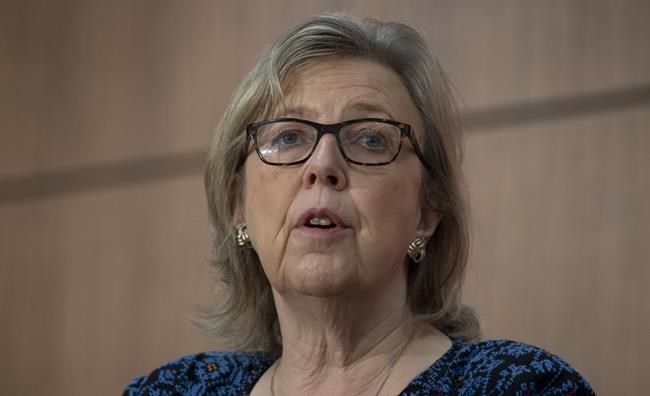
Green Party MP Elizabeth May speaks with media during a news conference Wednesday June 3, 2020 in Ottawa. One of the 10 people running to be the next leader of the Green Party of Canada told another candidate he was being "super racist" Tuesday after he suggested police in Canada should have to pay racialized Canadians a fee every time they stop them. THE CANADIAN PRESS/Adrian Wyld
Republished June 23, 2020 - 3:13 PM
Original Publication Date June 23, 2020 - 2:26 PM
OTTAWA - One of the 10 people running to be the next leader of the Green Party of Canada said Tuesday police should have to pay racialized Canadians a fee every time they stop them — an idea that prompted a strong response from one of his rivals.
The candidates faced off Tuesday in two 40-minute English-language debates hosted by TVO, Ontario's public broadcaster. The candidates all participated via online video links from their homes in B.C., Manitoba, Ontario, Quebec and Nova Scotia. They were divided into two groups of five to make the events easier to follow.
The debates were mostly cordial, even as the candidates disagreed about everything from the best form of carbon pricing to where the Green party sits on the political spectrum.
The final question in both debates was about the idea of defunding the police, a proposal that has entered the mainstream in recent weeks in protests against systemic racism in police forces in both Canada and the United States.
It was in the responses to that question, in the waning minutes of the second debate, that Montreal environmentalist Dylan Perceval-Maxwell said getting at systemic racism requires new ideas.
"One of my ideas is for the police to give $20 to every person of colour they stop," he said. "This would compensate a little bit to the trauma and inconvenience of being stopped and it would make police think twice before they stop them."
Meryam Haddad, a Montreal refugee lawyer who immigrated from Syria as a child, shook her head in disbelief and anxiously waited until she could respond.
"Mr. Perceval-Maxwell, I've got to admit your $20 solution is super racist," she said. "As a person of colour I find it very, very offensive."
She said the idea would do nothing to address systemic racism.
"What would be the next step, if the person gets beaten up we give them $50?"
Perceval-Maxwell said he just wants police to "stop people of colour less."
Most of the candidates have broadly similar views about policing, suggesting funds should be reallocated from police to social and health services but without abolishing police forces.
Vancouver astrophysicist Amita Kuttner was among the few who want the whole system torn up and rebuilt. Haddad said she does not think police can be reformed without abolishing the forces entirely, but she said she knows it would take time and there would likely have to still be something in place to provide safety for people.
Annamie Paul, a Black leader from Toronto and former adviser at the International Criminal Court, said Black and Indigenous people suffer the most from excessive use of force by police. But she said abolishing the police is "not the right strategy" because there are always going to be "very bad people doing some very predatory things and there is no amount of community or social services that is going to stop them from doing that."
"What we need to do is be very clear about what is the appropriate role for the police and what is the appropriate role for other types of social services," she said.
Paul said Canada should immediately begin documenting instances of excessive use of force to really understand the extent of the problem. She also said ensuring racialized and Indigenous people are put into positions of power is critical.
Also running in the race are Judy Green, Glen Murray, Andrew West, David Merner, Courtney Howard and Dimitri Lascaris.
French debates follow in July.
The new leader will be chosen in October via online and mail-in ballots. Elizabeth May, who had led the party since 2006, stepped down last fall but is remaining one of the three Green MPs in the House of Commons.
This report by The Canadian Press was first published June 23, 2020.
News from © The Canadian Press, 2020